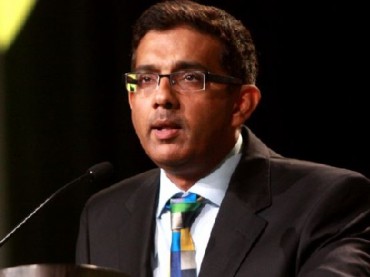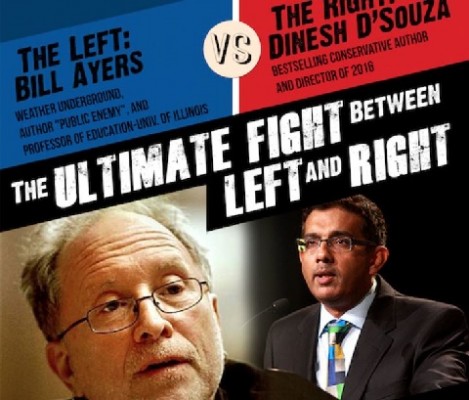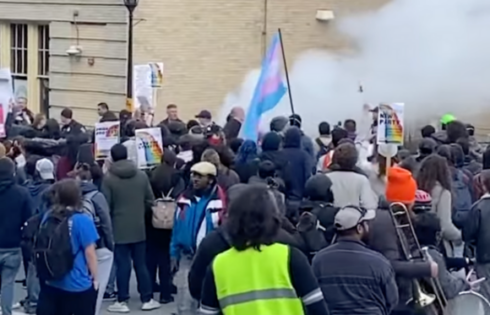
HANOVER – A debate between polar opposites took place at Dartmouth College on Thursday night, as conservative thinker and embattled documentarian Dinesh D’Souza went a few rounds with Professor William Ayers, the infamous convicted domestic terrorist and advocate of the radical left.
The debate, titled “America: Good or Bad?” started right away with a few good japes, as D’Souza told the audience: “We decided not to have metal detectors for the audience, but we did have metal detectors for the speakers.”
The highly anticipated debate, hosted by the Dartmouth Review campus newspaper – of which D’Souza is a former editor-in-chief – was D’Souza’s first public appearance after his federal indictment for campaign finance fraud, though he was neither asked for nor gave any comments on the subject.
Instead, the parlays focused around the fundamental differences between the speakers’ views on America.
While Ayers, a professor at the University of Illinois, launched his remarks by citing America’s “spirit of democracy,” and how change comes from mass resistance to oppression, D’Souza instead compared the United States not to some generic utopia, but to the world as a whole.
He drew heavily from his experience as an immigrant, citing how truly unique America is among nations, with its liberty and prosperity.
D’Souza then focused on the origin of America’s greatness.
“America is responsible for the greatest invention of all: wealth creation,” he said.
He said that this – the ability to create something out of nothing – was the true American ideal.
Unfortunately, he added, “the American Dream is being shrunken in America and growing other places in the world.”
He insisted that this is because the American ideal is not just for Americans.
He pointed out that the Declaration of Independence does not say “all Americans are created equal” but that “all men are created equal.” The economic and democratic growth of these foreign nations, he claims, is due to American innovation.
The two men proceeded to answer each other’s questions, as well as questions from the audience.
Perhaps the most startling question came from a Vietnam veteran in the audience who, though he was against the war, demand Ayers explain how he could be against the Second Amendment and still be for violent resistance. In line with his previous answers on subjects relating to his past, Ayers demonstrated that he could not explain this hypocrisy.
As the debate digressed, it began to rest on foreign policy, which D’Souza summed up with the words: “Trade with us, don’t bomb us.”
He took the view that despite the horrible effects of colonialism and slavery, they nevertheless precipitated the modernization of destitute nations and groups of people.
This drew the ire of Ayers, who retorted that this implies that the existence of a Jewish state must justify the Holocaust using D’Souza’s logic. Just as Ayers’ later demonization of Israel fell on deaf ears, this comment provoked more audible horror in the audience than respect.
The remainder of the questions shifted between the role of the United States as an international defender of freedom and civil rights.
Throughout Ayers’ remarks on the discriminatory nature of everything under the sun, D’Souza maintained that the founders provided for equal rights for all, and that contrary to Ayers’ assertion that “minorities” are being oppressed, it is religious people that suffer real discrimination.
Returning to the theme of America’s greatness, D’Souza summed up both his problem with Ayers’ views and his pride in the foundation of our country.
“(Americans can take) a certain justifiable pride, not just in the agitation, but in the principles the founders got right from the start,” he said.
The conference was co-hosted by Young America’s Foundation, and campus Republican and libertarian groups.
CLICK HERE to watch a video of the debate.
College Fix contributor Sandor Farkas is a student at Dartmouth College.
IMAGE 1: Gage Skidmore; IMAGE 2: Young America’s Foundation
Like The College Fix on Facebook / Follow us on Twitter






Please join the conversation about our stories on Facebook, Twitter, Instagram, Reddit, MeWe, Rumble, Gab, Minds and Gettr.